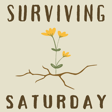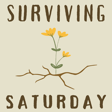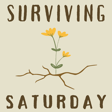
The Uniquely Transforming Power of Group Story Work - Pt. 2
So maybe for a while now you have been exploring your story--the formative incidents from growing up that have left their mark on you, for both good and ill. It's one thing to do that on your own, maybe even with the help of your favorite podcast.
Some of you may have even experienced how story work goes to a whole different level when you do it one on one, under the care and guidance of a seasoned counselor like Wendy, or a story work coach like Chris.
But why would anyone ever even THINK of diving down into the details of your story in a group setting? Isn't that just a recipe for making you feel even greater shame? Why would anyone EVER want to do that, and how could it possibly make a difference in your healing journey?
Join Wendy and Chris for Part 2 of this lively and frank discussion of the distinct ways that God has used story work groups to bring about deeper and longer lasting change and healing for each of them individually, as well as growth and greater intimacy in their marriage. You might be surprised at how it works, and how you can experience similar healing and transformation.




